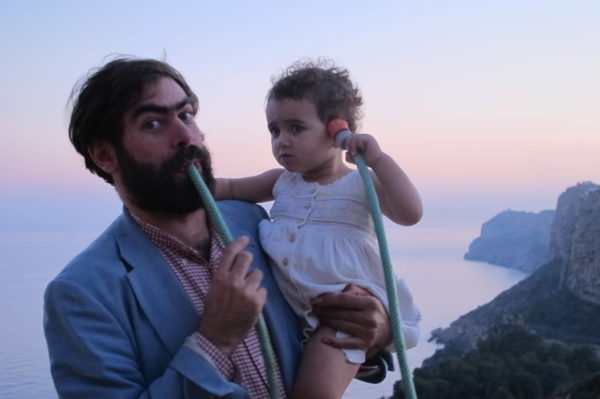The solitary project of Thomas Bonvalet initially focused on the nylon string guitar, taking short, dynamic and abrupt forms and limiting itself exclusively to the acoustic possibilities of the instrument. A radical posture, it constantly threatened to put itself at an impasse, or being forced into metamorphosis and movement. Bonvalet’s guitar thus became less and less identifiable. At the periphery it absorbed the sound of objects (metronome, tuning forks…) deviating from their common usage, integrating and splitting up their breath and sounds to reveal a new fleeting form. Amplification has also progressively become essential in this new instrumentarium/organism. However, the same undercurrent remains – the consideration of detail and tension, the search for possible sudden revelation.
Guitar seemed to have been your main instrument. Can you describe your journey towards the instrument and its gradual deconstruction?
It was my main instrument in the past. I’ve never really considered myself a guitar player. I developed a way of playing it in a specific context – the band Cheval de Frise – that instrument was new to me when I formed the band. Later, as a solo performer, I had the opportunity to explore its limits, taking into consideration my own limitation of course, and I quickly fell into a dead end. I was not interested by the guitar itself. I had a visceral need to be surprised and astounded by sound and I couldn’t reach that feeling any more. I also had the need to have my whole body involved. Nowadays, I’m playing my body in a sound installation rather than a specific instrument. There is an organisation of elements that are an extension of my body parts. It feels more like an augmented body than a “one man band” setup.
Your sets are pretty intricate, but still very playful. You use a number of various instruments. What influences your decision which instruments to include, modify, appropriate?
I don’t feel like I’m really making decisions. There are so many restrictions since I don’t want to use electronics, loops and pre-recorded elements. I’m also limited by the instrumentation because I have to be able to travel and carry all my stuff in a 23kg suitcase and I need to be able to keep a certain flow during the set and not spend too much time making a new installation between songs. A musical form often arrives from a new association of elements, from what could happen if I put one sound object next to another. Then things partly lead the direction themselves. I also follow my intuition. I don’t have musical thoughts, I’m not a cerebral musician.
In terms of the atmosphere, is there any that you prefer or look for when you make and play music? Does it differ when you record in
your studio and perform?
I’m just looking for sonic textures that would resonate with me, an affable resonance. I just need my body to feel good with it and there’s no difference between a studio and live performance, although it’s much more complicated in a recording context as it’s creating a distance, a double. And abstracted from the feeling of the gesture and from the sensitive experience of interacting with instruments, there’s sometimes the feeling of things being emptied and not standing up by themselves, so I have to recreate something to try to find that feeling again or something else that would stand out.
On one hand, your performances remind one of that of a bard or court jester from the old times, entertaining the audience (in a good way), but you also have a more sombre/dark side. Can you describe – if relevant – this duality?
There is no duality from my point of view as the entertaining aspect of my performances is truly unintentional. I try not to be too conscious of my movements and how the whole thing could be perceived as it could have a paralysing effect on me. This could impede my creativity.
What is the importance of the metronome in your work (and its unhidden presence)?
I’ve used mechanical metronomes since the very beginning of my solo project. I love the tone of that mechanical click and I love its physical presence too. As an old Godflesh fan I’ve always been fascinated by this cold and merciless drum machine style. Mechanical metronomes could convey a bit of that feeling, but they also have some charming irregularities and weaknesses.
What are you currently working on?
I’ve been doing more collaborations and playing in bands in the past few years, putting my solo project on the side a little bit. I’m working on the next Powerdove album that will be released next year and I’m also continuing to play live shows with bands like Arlt or Radikal Satan. As for the solo project, I’m trying to do a new album. I’ve got a few things recorded already but I‘ve had a hard time trying to be satisfied with what I’ve done so far. I will keep trying though!
Interview by Lucia Udvardyova
